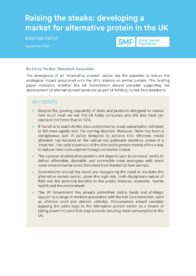The emergence of an “alternative protein” sector has the potential to reduce the ecological impact associated with the UK’s reliance on animal protein. This briefing paper considers whether the UK Government should support the development of alternative meat products as part of fulfilling its Net Zero ambitions.
- Despite the growing popularity of diets and products designed to reduce how much meat we eat, the UK today consumes only 6% less meat per capita in the home than in 1974.
- If the UK is to reach its Net Zero commitments, meat consumption will need to fall more rapidly over the coming decades. However, there has been a conspicuous lack of policy designed to achieve this. Whereas media attention has focused on the radical and politically sensitive option of a ‘meat tax’, the rapid expansion of the alternative protein market offers a way to reduce meat consumption through consumer choice.
- The success of alternative proteins will depend upon businesses’ ability to deliver affordable, desirable, and accessible meat analogues with much lower environmental costs than meat from traditional farm animals.
- Governments around the world are recognising the need to incubate the alternative protein sector, given the high-risk, multi-disciplinary nature of R&D and the potential benefits to the public finances, economy, human health and the environment.
- The UK Government has already committed public funds and strategic support to a range of markets associated with the Net Zero transition, such as offshore wind and electric vehicles. Policymakers should consider applying the same logic to the alternative protein sector as a means of taking a non-intrusive first step towards reducing meat consumption in the UK.

Download the briefing PDF
